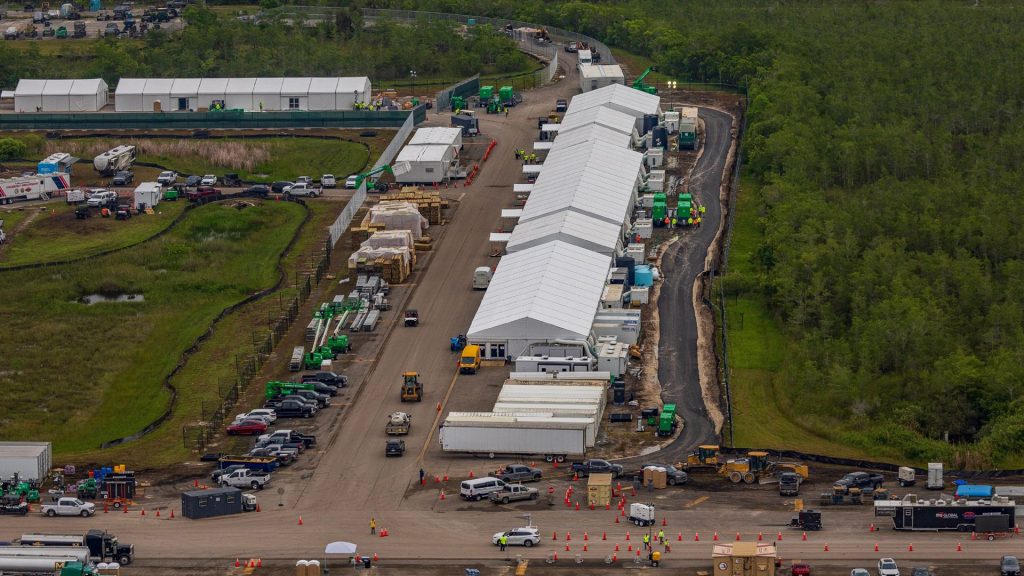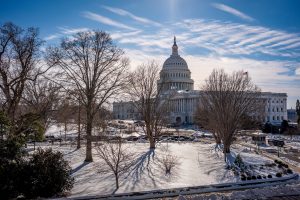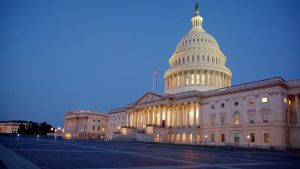Judge orders temporary halt to construction at ‘Alligator Alcatraz’

A federal judge issued a two-week temporary restraining order on construction at the immigrant detention facility known as “Alligator Alcatraz.” The ruling comes amid a lawsuit over environmental concerns about the facility.
Judge’s ruling
Federal Judge Kathleen Williams gave her ruling to give herself time to determine if the facility violates environmental laws.
“It is basically an order that a judge imposes to keep the status quo until they figure out what is going on in terms of the allegations,” Ediberto Roman, a law professor at Florida International University, told Straight Arrow News.
Several environmental groups filed suit, claiming the facility violates the National Environmental Policy Act. Their suit said the project threatens endangered species in the area.
“We’re pleased that the judge saw the urgent need to put a pause on additional construction, and we look forward to advancing our ultimate goal of protecting the unique and imperiled Everglades ecosystem from further damage caused by this mass detention facility,” Eve Samples, executive director at Friends of the Everglades, said to the Associated Press.
Despite Thursday’s ruling, Gov. Ron DeSantis said this wouldn’t impact immigration enforcement.
“Operations at Alligator Alcatraz are ongoing and deportations are continuing,” Desantis said on X.
The judge’s ruling follows two days of testimony over environmental concerns.
“If the judge finds that Alligator Alcatraz is violating pertinent environmental laws, federal laws, in terms of the treatment of the surrounding areas, the judge can order a stop. Not only in terms of future construction, but close down the entire detention center,” Roman said.
Alligator Alcatraz lawsuits
This lawsuit could lead to the entire facility being taken down, despite having nothing to do with immigration, which has been the central focus of most coverage of Alligator Alcatraz.
“There have been allegations that the individuals detained there have no access to the outside world, even questions as to whether they have access to counsel,” Roman said. “Those are basic tenets of criminal law and in our justice system, our due process system. And the sad state of affairs, if we shall, perhaps not use the word irony, that it’s the protection of wetlands that perhaps can, can prevent continued human rights abuses.”
Straight Arrow News spoke with Anna Weiser, a lawyer with Smith & Eulo law firm, who has clients at the facility.
“If they’re finding all kinds of violations, and now the judge issued an injunction for further construction, yes, to me, this is one step closer to shut it down,” Weiser said.
Weiser’s client Gonzalo Almanza is one of the lead plaintiffs in an ACLU-backed lawsuit against the facility over the treatment of detainees. She sees this ruling as one step closer to getting her client out of there.
“There’s nothing that I like about that facility,” Weiser said. “And if they end up holding construction even temporarily, that’s great. That’s great news, and I hope they dismantle and close it, shut it down altogether and transfer him.”
The Trump administration has maintained that this facility is necessary to execute the president’s promise of mass deportations and was not happy with today’s ruling.
“It is another attempt to prevent the President from fulfilling the American people’s mandate for mass deportations,” Tricia McLaughlin, a DHS spokesperson, said in a statement to Reuters.
Ignoring court orders
The environmental groups had asked for a preliminary injunction in the case, which would have continued into next week. However, on Thursday, they asked for a temporary restraining order to halt the construction.
The judge asked a member of the defense if the state would just agree to halt construction, but the lawyer said he couldn’t guarantee the stop would happen.
Even with that ruling, there’s still concern that construction could continue anyway at the facility. The Trump administration has ignored court orders before, and they can be hard to enforce.
“Courts don’t have an army, right? It’s the executive, the president has their army, where they effectuate the laws,” Roman said. “But if we’re going to respect our tripartite system of government, with the judiciary making interpretations of the law, the executive is supposed to abide by them.”





